'When one was with Mother, one realised you were with somebody who was the nearest person to God.'

Preeti Roy is swamped with a collage of precious memories. The 83 year old has had a ringside view of Mother Teresa's journey from a committed missionary providing succour to the helpless to a globally venerated saint.
Fifty-five years as a co-worker with the Missionaries of Charity and treasured moments with Mother Teresa have given Preeti glimpses of the simplicity behind the celebrated persona.
As a 27-year-old corporate wife in Calcutta she volunteered as a co-worker with the Missionaries of Charity and was exposed to Mother's work with abandoned babies, dying destitutes and leprosy victims.
Her late husband Dipak Roy, was at 34 the youngest chairman and managing director of J Thomas, the largest and oldest tea auctioneer in the world. A post he held for a record 22 years.

As co-worker, Preeti joined a group of young ladies who would meet every Thursday to make sachets for medicines, both pills and powder, for leprosy victims.
Ostracised by society, these patients were nursed by Mother Teresa's band of blue-bordered sari-clad sisters at a home in Titagarh, which Mother had set up for them in the suburbs of Kolkata.
"These weekly meetings which were called Mother's pill mornings are still held at the residence of Mrs Sunita Kumar, a co-worker and spokesperson for the Missionaries of Charity. We still interlock and seal the sachets for easy distribution once the medicines are filled in them," Preeti tells Payal Singh Mohanka.
There were some Thursday meetings where Mother Teresa too would be present.
"She would tell us about the plans we were to help her with, the money that had to be raised for feeding programmes at the various homes.
"We saw her work tirelessly for neglected sections of society.
"Mother put up a fight to get non-criminal women and girls freed from jail," she says.
While Mother Teresa was immersed in the task of comforting the helpless, she would tell her young volunteers their first duty was towards their own home.
"Be kind to your children, be nice to your husband when he returns from work. She had qualities of a saint, but was also very human."

It was when Mother Teresa became the first recipient of the Templeton Award in 1973 that the co-workers realised that awareness about her work was spreading far and wide.
"She gave each of us a photograph of hers. I made her sign it much to her surprise," says Preeti.
The photograph stands proudly on a cabinet near her front door, visible each time she enters or leaves her apartment. Her personal diary too has a photograph given by Mother Teresa after she was awarded the Nobel Prize in 1979.
"Each year when I change my diary, I insert this picture. I feel satisfied and secure," she adds.
After Mother Teresa received the Nobel, she was taken aback by the sight of busloads of visitors heading to Mother House.
The co-workers saw 'their' Mother becoming a celebrated public figure. Much to their amusement, she once asked, 'Have I become a tourist attraction?'
While some recollections well up her eyes, others fill the room with her laughter, "Once the chairman of the World Bank was visiting Mother House, the headquarters of the Missionaries of Charity.
"This was not unusual, dignitaries often came from Bombay or Delhi to Calcutta and went straight to Mother House to see Mother. She was often not aware of who the VIP was. Some of us were asked to come and be with her.
"The World Bank chairman arrived with another dignitary who introduced him to Mother. Mother looked very perplexed and said, 'World Bank? I've never heard of the World Bank. I know Hongkong Bank, I know Bank of India, but where is the World Bank?'
"The poor dignitary tried to explain. When he left, we had a good laugh and told Mother you're not supposed to say those kind of things!"
There was purity and child-like innocence. Preeti's face lights up with a smile as she recalls going to see Mother Teresa before leaving for the US to meet her children.
She asked Mother for the little medals she distributed. These miniature medals had a figure of Virgin Mary engraved on them.
"'What will you do with them in America?' she asked me. 'Mother, my children's friends ask for these.' Mother looked quizzically at me, 'They know about me? They have heard of me in America?' 'Mother the whole world knows about you,' I told her!"
Before she received international recognition, she belonged to Calcutta. Gradually she became the world's much revered public figure but her inherent simplicity could barely fathom the extent of her fame.

In the early eighties the English cricket team came to play in Calcutta. They won the Test and the captain's bat was going to be donated to Mother Teresa.
Preeti suggested the bat be auctioned and the money raised given to Mother, "My husband auctioned the bat and ITC bought it for a lakh of rupees. We co-workers were overjoyed.
"My husband too joined us when we went to Mother House to hand over the cheque. Mother was astonished, 'So much money for a cricket bat!' Mother the money is for you, we explained. She couldn't comprehend why anyone would pay that amount for a bat!"
Preeti recalls watching a television interview of Mother Teresa's by (British writer) Malcolm Muggeridge.
"We were in London, my husband called out to me. I came and sat down to watch Mother.
"The interviewer asked her, 'In Calcutta you work with the poor in the slums. Why have you come here to England? There are no slums, no poverty here?' With a solemn expression Mother answered, 'Yes there is no poverty for money, but there is a lot of poverty for love.' Muggeridge was taken aback by her response."
Mother Teresa often spoke about the lack of love and the abject loneliness plaguing those in affluent nations.
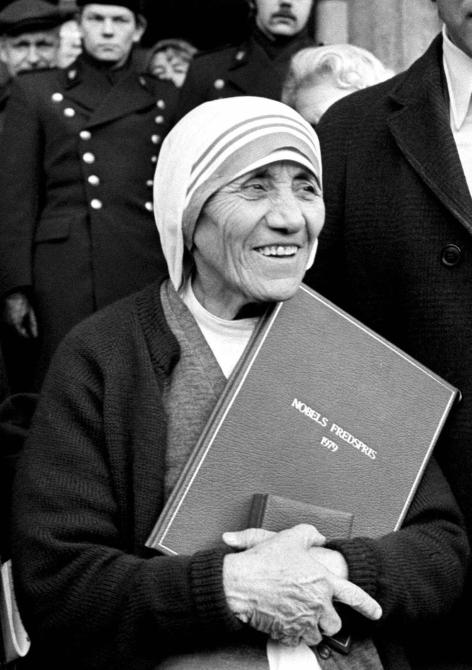
When adversity struck it was Mother's support that helped Preeti to bravely face the challenge with exemplary courage. "Mother's powerful presence was a blessing in my life. She gave me strength."
Her husband's tragic death in an unfortunate accident in January 1991 shocked the city.
The Roys had attended a party on a launch on the Hooghly. When they disembarked and were on the jetty, Preeti stepped back into the launch as she realised it was midnight and she could wish the birthday lady in person.
When she returned moments later, her husband was missing. There was panic all around. Had he fallen into the water? Was it a case of abduction? It was a devastating time for the family. For four nights the search continued.
Preeti went to Mother Teresa On the blackboard outside the chapel there was a notice asking the Sisters to pray for him. Mother had received the news from the co-workers.
"The accident happened on Saturday night. I went to see Mother on Monday and again on Tuesday. She put her hands on my shoulders and she said, 'We have to find the body. Otherwise all your life you are going to look around, expecting to see him,' she said."
A sense of closure was crucial. Mother gave her one of her medals. She asked her to go to the jetty where she had last seen her husband and throw the medal in the river and say a prayer.
Mother placed her hand on her head and blessed her. It had been four nights since her husband was missing.
The next morning Preeti received a call from the police. Her husband's body had been found, just a few metres away from where she had last seen him.
"Mother came home to bless the body. She held my hand and blessed my children too. She prayed to Jesus. She asked me to pray to my Gods, Shivji, Ma Kali. She gave me so much strength to deal with this crisis."
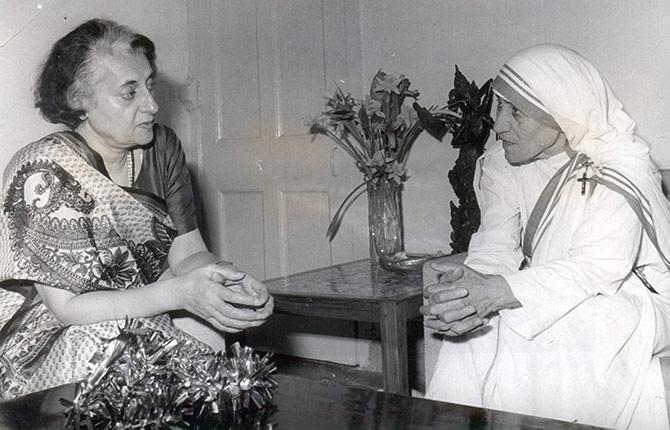
One morning in 1996 Preeti woke up with a dream. "I had seen Mother with her arms out, coming towards me and putting her arms around me like she used to do when I would go to Mother House to pray with her.
"Startled, I got up and went about my morning routine. I was ready to leave for Women's Friendly Society where I still volunteer.
"I was driving down Lower Circular Road. At the crossing I was to turn left on Park Street. Suddenly I remembered the dream that had woken me up. I told the driver to go straight down the road towards Mother House instead."
When she reached she found a Mercedes parked outside the pencil-thin lane that lead to the front door of Mother House.
She presumed a dignitary had come to meet Mother and she wouldn't be able to see her that morning.
Gingerly, she stepped in and walked down the passage from the chapel to the convent.
The memory has left an indelible imprint. She recalls, "There was a suited gentleman on one bench with an attendant holding what looked like a rolled up painting.
"I sat on the other bench. As we wait for Mother to come, he asked if I would like to see the painting of Mother's that he had bought for her to sign and unrolled it.
"After a few minutes, Mother entered. Since the gentleman was waiting before me, I thought Mother would attend to him first. But much to my surprise I was reliving the dream that had woken me up.
"'Preeti, you've come,' she said with outstretched arms, as I walked up to do pranam, as we Bengalis do, and touch her feet. She put her arms around me and hugged me and blessed me. It was as though she was expecting me!
"For years I couldn't talk about this. I kept this to myself. It was like a miracle. That was the last time I saw her."
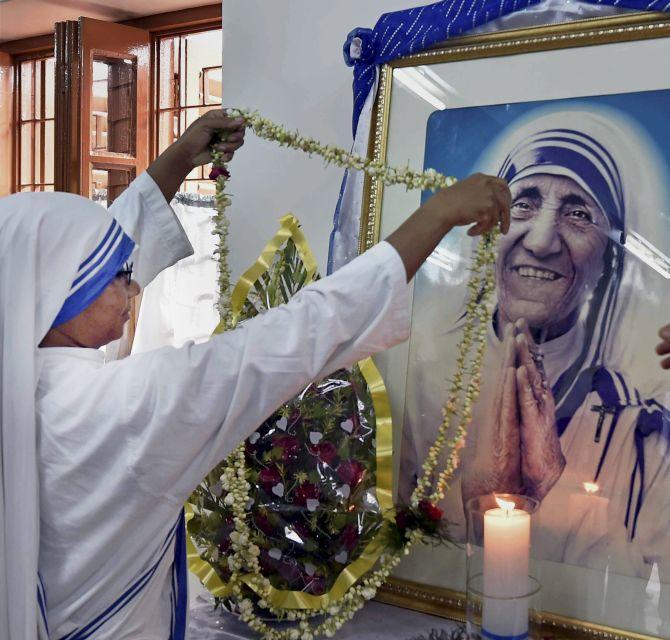
Mother Teresa's health gradually deteriorated and she passed way the following year. Leaving behind heart-warming memories of an Albanian nun, who came from faraway and gave those who were suffering a life of dignity, embraced them with love and compassion.
As Preeti sums it up, "How? Why? I get tears when I think about it. We don't know what God is like, right?
"We just imagine there's somebody there. I believe in all religions. I pray to everybody. But when one was with Mother, one realised you were with somebody who was the nearest person to God. She must have been God incarnate."
Feature Presentation: Ashish Narsale/Rediff.com
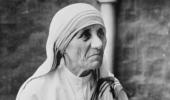
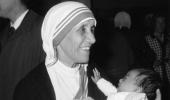









 © 2025
© 2025